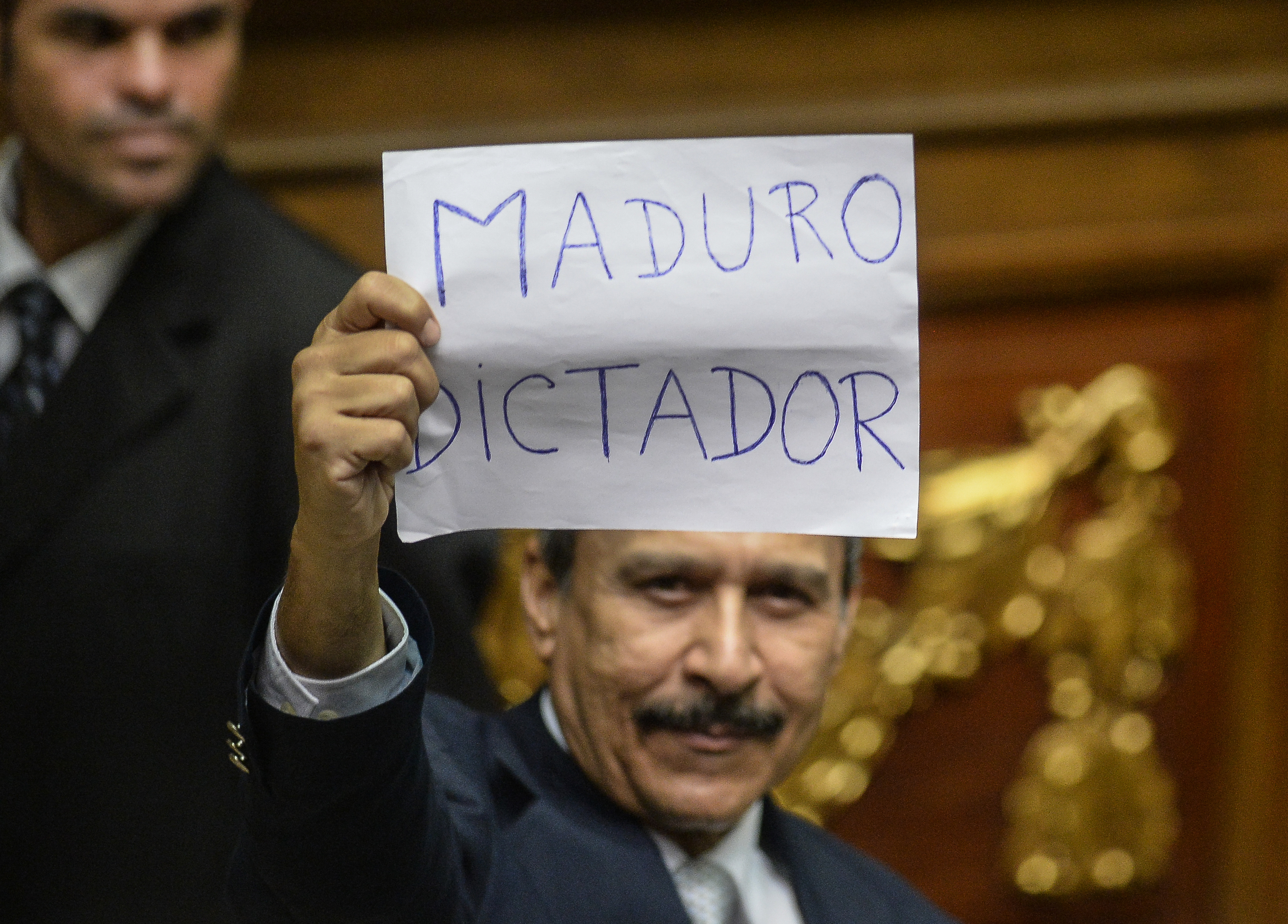
Venezuela’s opposition-majority legislature declared Sunday that President Nicolas Maduro’s “regime” committed a coup d’etat when authorities blocked a referendum on removing the unpopular leftist leader from power. / AFP PHOTO
by Maria Isabel SANCHEZ
CARACAS, Venezuela (AFP) — Venezuela’s opposition-majority legislature declared Sunday that President Nicolas Maduro’s government had committed a coup d’etat by blocking a referendum on removing him from power, vowing mass protests and international pressure.
Furious over the electoral authorities’ decision to suspend the process of organizing a recall vote, opposition lawmakers passed a resolution declaring “the breakdown of constitutional order” and “a coup d’etat committed by the Nicolas Maduro regime.”
The measure came during an emergency session on the economic and political crisis gripping the South American oil giant, which briefly descended into chaos when a group of Maduro supporters forced its way past security guards and burst into the National Assembly, causing lawmakers to halt the proceedings for 45 minutes.
The legislators then called on Venezuelans to “actively defend” the constitution, declaring they would ask the international community to “activate mechanisms” to restore democracy.
“An ongoing coup d’etat has been perpetrated in Venezuela, culminating in the decision to rob us of a recall referendum. We’re here to officially declare the regrettable and painful rupture of constitutional order,” said majority leader Julio Borges of the center-right opposition coalition, the Democratic Unity Roundtable (MUD).
On Monday, the assembly will “lay the groundwork for a session that would include a legal and political trial of the president… to determine what his role is in the interruption of constitutional order,” Borges warned.
Pro-Maduro lawmakers accused the opposition itself of seeking to stage a coup.
“Don’t try to take advantage of these hard times to finish off our nation,” deputy Earle Herrera said.
Dual national?
Despite its harsh words, the legislature’s resolution is largely symbolic.
The Supreme Court has declared the legislative majority in contempt of court for defying it by swearing in three lawmakers at the center of an electoral fraud investigation.
The opposition, which says the accusations are trumped up, condemns the high court as a Maduro lapdog.
The court has slapped down every bill passed by the legislature since the opposition took control in January.
Lawmakers nevertheless said they were going to address the issue of Maduro’s purported dual nationality — Colombian and Venezuelan — in session on Tuesday. If confirmed, it would make him constitutionally ineligible to be president.
Ruling party bloc leader Hector Rodriguez said that Maduro sent a message from the Middle East: “Tell them that I send my greeting, send a hug and that I will see them at the table to have a dialogue.”
New low
Venezuela’s crisis hit a new low Thursday when the National Electoral Council (CNE) indefinitely suspended the recall referendum process after criminal courts in five states ruled the opposition had committed fraud in an initial petition drive.
Holding a recall referendum — a right guaranteed under Venezuela’s constitution — was the opposition’s main strategy to get rid of the man they accuse of driving the once-booming country to the brink of collapse.
The opposition had been gearing up for the last hurdle in the complex process: a three-day drive starting Wednesday to collect signatures from four million voters demanding a recall vote.
Now that the authorities have stymied that bid, furious opposition leaders have promised the start of a new wave of nationwide protests on Wednesday.
Maduro touring Middle East
Political analysts have warned of a risk of violent unrest in this country of 30 million people.
Hit by the fall of global oil prices, the economy has crashed. Food shortages have prompted riots and looting in recent months.
Rioting at anti-government protests in 2014 left 43 people dead.
But the divided opposition has struggled to mobilize sustained, large-scale protests since then.
Maduro, the political heir to late president Hugo Chavez (1999-2013), derides his opponents as elitists and calls the economic crisis a capitalist conspiracy.
He accuses the “fascist right” and the United States of plotting to overthrow him.
In recession since the beginning of 2014, Venezuela’s economy is facing a contraction of 10 percent this year and inflation of 475 percent, with the International Monetary Fund predicting a rise to 1,660 percent next year.
The latest twist in the crisis comes as Maduro is on a trip abroad, touring Middle Eastern countries to push his plan for major oil producers to slash output.
Venezuela desperately needs oil prices to rise to reverse its economic crash.
Public support for Maduro has crumbled amid the crisis.
A recent poll found more than 75 percent of Venezuelans disapprove of the socialist leader.
© 1994-2016 Agence France-Presse








